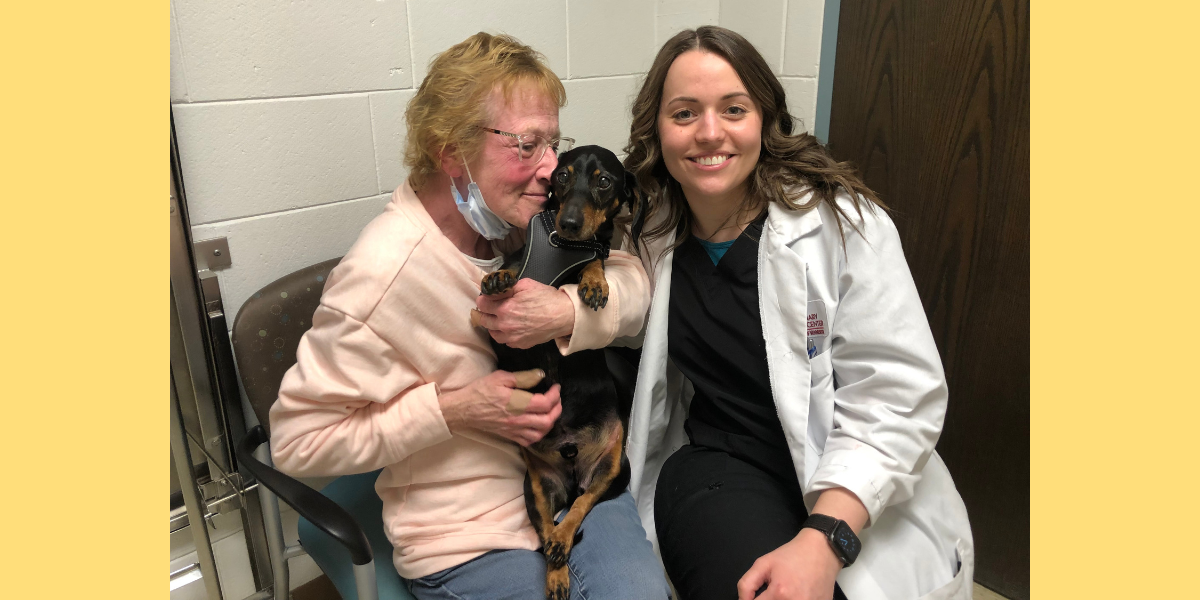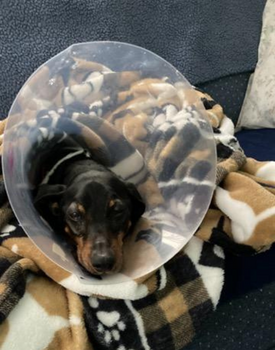A sight for sore eyes
Cataract surgery restores vision and joy to the life of miniature dachshund

Cataract surgery restores vision and joy to the life of miniature dachshund
Diane Johnson (left), Socrates, and Dr. Jordan Roberts sit together at the Lewis Small Animal Hospital. Photo courtesy of Jordan Roberts.
When the world went dark, so did Socrates. The 12-year-old miniature dachshund had been rendered blind by a medical condition, and his adjustment to vision loss was not going well.
“He wasn't getting used to being blind,” his owner, Diane Johnson, recalls. “They say dogs will get used to it, and sometimes it'll take them a bit but he just wasn't. He looked so sad. He kept his head down all the time and was bumping into everything.”
Socrates and his brother, Napoleon, have been part of Johnson’s life since they were born. Socrates' medical woes started when Johnson and her husband noticed him losing weight and drinking a lot of water. A trip to the veterinarian in March 2022 revealed a diagnosis of diabetes.

A June appointment with an endocrinologist brought another blow. As a side effect of his diabetes, Socrates had developed cataracts and would soon be blind. Cataracts are a condition in which the lens of the eyes becomes cloudy and has a negative impact on vision.
Two weeks later, Johnson said Socrates could no longer see.
Looking to help him any way she could, Johnson made an appointment that fall with Dr. Jordan Roberts, an ophthalmologist with the University of Minnesota Veterinary Medical Center. While genetics are behind most cases of canine cataracts, it’s especially common for dogs diagnosed with diabetes.
“Up to 80 percent of dogs will develop cataracts within 16 months of their diabetes diagnosis, so it is not at all surprising that Socrates developed his cataracts when he did,” Roberts says. “Diabetic cataracts in dogs are often very advanced and lead to complete loss of functional vision in a very short amount of time.”
An elective surgical procedure was available to remove Socrates' cataracts, but it required significant pre- and post-operative care. To ensure he would be the best surgical candidate possible, Socrates needed to have medication applied to his eyes to reduce inflammation inside them before a procedure could occur. To Johnson, potentially seeing her beloved dog happy was worth the work.
Socrates underwent cataract surgery in January 2023. The procedure involves inserting surgical instruments into the eyes that break up the cataracts using ultrasonic waves—a process known as phacoemulsification. The cataracts are then removed and an artificial lens is implanted into the eye. Socrates’ surgery went well, and he stayed the night for observation.
On the car ride home the next day, Johnson could already see an improvement in his vision. Over the next few days, Socrates began to brighten.
“You could tell it was getting better because he just wanted to look at everything,” she says. “We had to keep him pretty mellow so he could heal, but his personality had changed. He was like his old self again—a happy dog with a wagging tail.”

Recovering at home meant Socrates needed to keep a low profile. His activity was restricted to keep him quiet and calm in the weeks following surgery, including only short walks and no baths, barking, or jumping on and off furniture. So far, Socrates’ recovery has gone well, according to Roberts.
“Restoring vision is one of the most rewarding aspects of my job as a clinical ophthalmologist,” she adds. “We have all noticed a significant improvement in Socrates’ confidence following his cataract surgery. Diane has been very diligent about his aftercare, which no doubt has helped him have a quick and smooth recovery.”
Socrates’ surgical outcome is a positive one, but Roberts cautions that not every dog is a good candidate for the procedure due to factors such as other medical conditions or the commitment to care required before and after the surgery.
“Socrates is an example of when all the pieces of the puzzle come together, but that’s not always the case,” she says. “But, dogs that are visually impaired from their cataracts can still live a wonderful quality of life with their owners as long as they are in a safe and stable environment.”
As for Socrates, he’s back to enjoying life with his family. He and Napoleon play tug-of-war with stuffed animals, and he’s pursuing his passion for chasing and chewing on toy balls. Johnson says she is grateful to Roberts and Socrates’ care team at the VMC for bringing back her happy little companion.
“If anybody can do this for their dog, they should go ahead and do it,” she says. “They won't regret it. It is a lot of aftercare, but it's worth it. It's well worth it.”
Individuals like you can support the mission of the VMC with a charitable gift to support the Ophthalmology Service Fund. Gifts to this fund can be used to help meet critical needs such as purchasing a new cataract surgery machine. Anyone interested in financially supporting the Ophthalmology Service Fund to help more dogs like Socrates can contact Development Officer Will Haugen at hauge442@umn.edu or 612-625-7714 for more information.